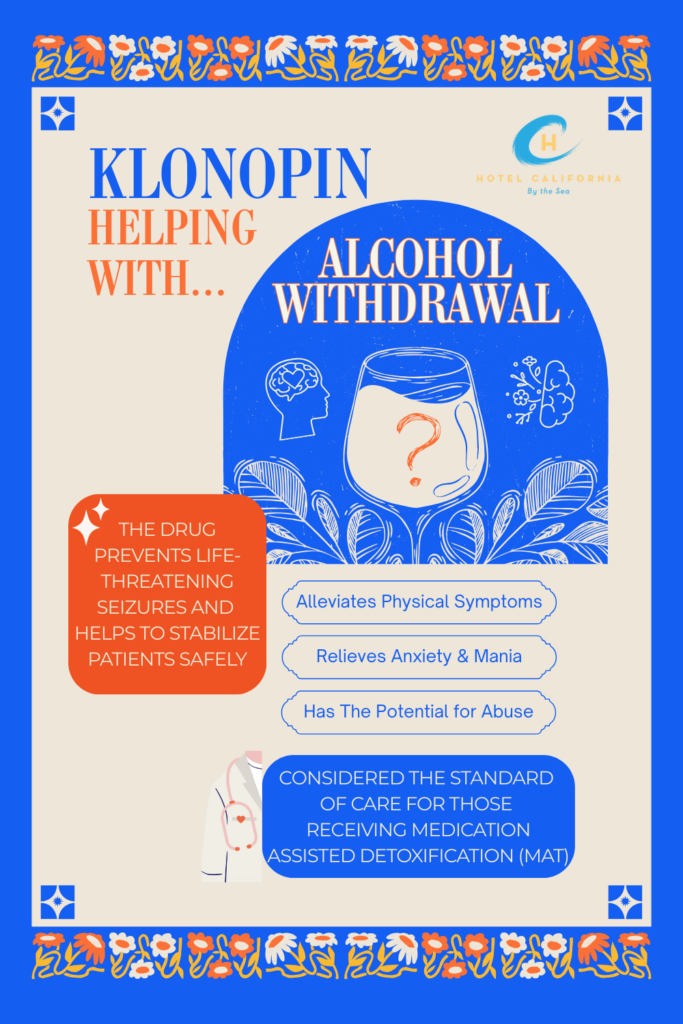Is Klonopin helping with Alcohol Withdrawal?
Benzodiazepines are considered the gold standard when it comes to medication-assisted treatment for acute alcohol withdrawal. Those who are prescribed Klonopin in helping with alcohol withdrawal have found both risks and benefits to using the medication. Klonopin is a benzos medication that can be prescribed to help treat alcohol withdrawal because of its ability to relieve symptoms. It can help decrease the risk of dangerous alcohol withdrawal complications such as delirium tremens.

Those who regularly consume alcohol can eventually develop an increased tolerance to the drug. Alcohol withdrawal or alcohol withdrawal syndrome is characterized by dramatic changes in the brain’s chemistry caused by excessive or prolonged alcohol use. When a person stops drinking abruptly or dramatically reduces alcohol intake, it stimulates a sudden drop in brain chemicals causing withdrawal.
Alcohol withdrawal is a challenging condition that produces unpleasant and uncomfortable mental and physical sensations. Cases can range from mild to severe. Benzos medications are often the first line of defense when it comes to treating these withdrawal symptoms. They help reduce the severity of symptoms as well as help alleviate them altogether.
What is Alcohol Withdrawal Syndrome?
When you drink alcohol, it increases the levels of GABA neurotransmitters in the brain. This brain chemical affects the central nervous system. When the GABA receptors are stimulated, it releases inhibitory neurotransmitters throughout the brain and body producing feelings of relaxation and calm. It reduces brain activity.
When you stop drinking or lower the amount of alcohol intake, the levels of the inhibitory neurotransmitters also decrease. When high amounts of GABA chemicals are no longer being produced at a sufficient quantity, they no longer produce feelings of relaxation and sedation. Instead, the body will begin abruptly increasing its excitatory neurotransmitters. When this happens, it can throw off the balance of brain chemicals causing the alcohol withdrawal symptoms.
Symptoms of alcohol withdrawal include panic attacks, hand tremors, rapid pulse, nausea, chills, vomiting, diarrhea, sweating and disorientation. More severe side effects can include hallucinations, psychosis, seizures, delirium tremens, coma and death.
When it comes to treating alcohol withdrawal symptoms, benzos medications such as Klonopin, are the most commonly prescribed drugs.

What is Klonopin?
Klonopin, also known by its generic name clonazepam, is a long-acting and highly potent GABA receptor agonist. It is a benzos prescription medication often used for the treatment of seizures, nonconvulsive status epilepticus, epilepsy, panic disorder and agoraphobia. Some off-label uses include the treatment of insomnia, acute mania and restless leg syndrome. It can also be prescribed in the treatment of alcohol withdrawal.
For seizure disorders, Klonopin is mainly used to help manage symptoms of epilepsy and nonconvulsive status epilepticus (complex partial seizures or absence seizures). It can be helpful in treating psychomotor, myoclonic epilepsies, grand mal and focal motor seizures.
For panic disorders, Klonopin is effective for short-term management of symptoms.
For acute mania, Klonopin acts as an anticonvulsant and serotonin agonist. This helps reduce the need for antipsychotic drugs to treat acute mania, which can significantly decrease the risks and side effects of using antipsychotic drugs.
How does Klonopin work? Klonopin is a sedative medication that can help reduce anxiety, and panic, assist with sleep, lessen muscle spasms and help control seizure activity in the brain. It works by stimulating the release of GABA chemicals. These calming neurochemicals alleviate symptoms such as anxiety. It causes the body to instantly relax and can produce feelings of sedation and even euphoria. Klonopin also has serotonergic properties that can increase serotonin synthesis.
Side effects of Klonopin
- Lightheadedness
- Tiredness and fatigue
- Feeling dizzy
- Slurred speech
- Lack of coordination and poor movement control
- Feeling clumsy or unsteady on your feet
- Confusion
- Difficulty moving and balance
- Sore throat and runny nose
- Respiratory depression
- Depression, suicidal thoughts and behaviors
- Severe sedation
The Schedule IV controlled substance can be taken orally 2-3 times per day. The effects of the drug can occur within a few hours. The long-lasting drug is very powerful and can put the user at risk for misuse, abuse and addiction. Due to its potent nature, healthcare providers tend to only prescribe the medication for short-term use of 2-4 weeks. Six weeks would be the maximum amount of time that can be safe for use.
How effective is Klonopin in Helping with Alcohol Withdrawal?
In a medical setting, Klonopin can be prescribed to alleviate physical symptoms and the psychological risks of alcohol withdrawal syndrome. It is often used in the management and prevention of delirium tremens and can also be effective in minimizing muscle spasms, seizures and panic-related symptoms.
Klonopin can produce feelings of euphoria similar to those experienced in alcohol use. When a person is in alcohol withdrawal, they are often overcome by urges to self-medicate and treat those feelings of panic, anxiety and muscle tension. Klonopin can help reduce the severity of these symptoms, helping to relieve some of the discomfort of alcohol withdrawal. It acts similarly to alcohol, producing a sedative effect. However, like other sedatives, long-term use of Klonopin is not recommended due to its potential for abuse and addiction.
Check Your Insurance Coverage for FREE
Find out if your insurance covers addiction treatment in minutes. We accept most insurance!
What are Benzodiazepines?
Benzos are a classification of sedative drugs used to treat a wide variety of ailments. They are often used in the treatment of alcohol use disorder to help with alcohol withdrawal symptoms.
Benzos are controlled substances that carry a risk for abuse and addiction. When it comes to addiction potential, about 30.5 million Americans have an addiction. About 17.5% of those have engaged in benzos misuse. The side effects of benzos misuse include mood swings, impaired judgment, slurred speech, cognitive issues, memory issues, respiratory problems, confusion, headache, nausea, vomiting and diarrhea.
Benzos work by targeting the central nervous system to slow down your body, calm your brain and lessen the impact and severity of withdrawal side effects. Benzos have a similar mechanism of action to alcohol making it highly effective in treating alcohol withdrawal symptoms.
Benzos for Alcohol Withdrawal
The most commonly used benzos for alcohol withdrawal treatment include Librium, Valium, Ativan and Klonopin. They are often prescribed for short-term use and are very effective in helping to reduce the severity of withdrawal side effects. Benzos can be prescribed for up to 3 days during detox. After detox, they can be tapered to lower doses for up to 6 weeks.
In general, long-acting benzos tend to be the most effective because they need to be administered less frequently and last longer. Short-acting benzos like Xanax produce a greater chance of the user experiencing rebound withdrawal symptoms.
When used for the treatment of alcohol withdrawal, benzos are typically prescribed in three distinct ways. Symptom Triggered Regimen (STR) is a process in which a person’s withdrawal symptoms are rated on a scale and their drug dose is administered based on withdrawal severity. This is the preferred method of treatment because it involves the least use of medication without the risk of over-sedation. This type of treatment is only used in an inpatient setting under medical guidance.
Fixed Tapering Dose Regimen (FTDR) is when a patient receives fixed doses of benzos on a predetermined schedule. The medication is then slowly tapered off. This method can be helpful when a patient cannot be monitored or is unable to rate their withdrawal scale. This type of treatment is best in an outpatient setting and is effective for mild symptoms of withdrawal.
Loading Does Regimen (LDR) is when a long-acting benzos is given in high doses immediately. This is helpful for a patient with a history of severe alcohol withdrawal. However, this method requires close monitoring and is only used in a hospital setting.
Benefits of Benzos for Alcohol Withdrawal
- Helps patients achieve stabilization
- Helps provide a safe detox environment
- Helps prevent delirium tremens and seizures, which can be life-threatening
- There are many types of benzos to choose from
- They are generally well-tolerated
- Helps to ease the patient through uncomfortable withdrawal symptoms
- They have a low risk of dependence when used short-term under the guidance of a medical professional
Reach out to Hotel California by the Sea
We specialize in treating addiction and other co-occurring disorders, such as PTSD. Our Admissions specialists are available to walk you through the best options for treating your addiction.
Treatment of Substance Use Disorder
Benzos such as Klonopin are commonly used medications to help treat the symptoms of alcohol withdrawal. In fact, most benzos are considered the standard of care when it comes to medication-assisted treatments during detox from alcohol. Professional behavioral health treatment programs such as Hotel California by the Sea, provide MAT options for patients with alcohol use disorder.
We provide treatment at all levels of care including detox, residential, PHP and IOP. We utilize evidence-based methods such as CBT, DBT and EMDR therapy. Hotel California by the Sea is dedicated to helping clients achieve their goals in sobriety and overcome their alcohol addiction.
References:
https://rehabclinicsgroup.com/medications/clonazepam-and-chlordiazepoxide-in-detox/
https://alcoholawareness.org/alcoholism/detox/medications/clonazepam
https://www.ncbi.nlm.nih.gov/books/NBK556010
https://www.addictioncenter.com/alcohol/benzodiazepines-alcohol-withdrawal
https://www.goodrx.com/klonopin/what-is
https://www.bicyclehealth.com/blog/benzodiazepines-for-alcohol-withdrawal
